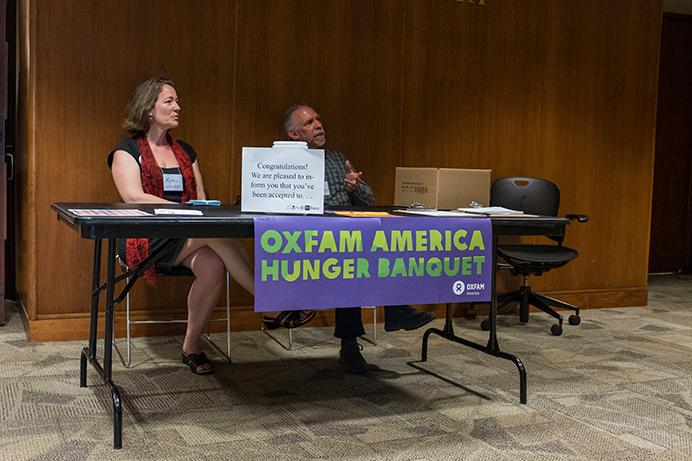By Charles Peckman
The sights and sounds of filled plates and clanking silverware filled the IMU Second-Floor Ballroom with a simple goal: to raise awareness about college food insecurity.
The University of Iowa Hunger Banquet, put on by the Food Pantry at Iowa on April 9, aimed to discuss food insecurity, a problem on campuses across the nation.Over a free meal, organizers of the event gave attendees a firsthand look at the struggles of college students who do not have consistent access to food.
According to the Food Pantry’s website, the mission of the organization is to “provide healthy and nutritious food to food-insecure students, faculty, and staff and raise awareness about hunger issues on campus.”
The Food Pantry, which has been open since August 2016, has received a positive reaction from the UI community, said Sarah Ingwersen, a codirector of the Food Pantry.
“Since we opened last year, we have had over 175 clients,” she said. “Overall, we have had over 700 visits to [the pantry,] and although that may seem small in comparison to the tens of thousands of people in the UI community, if people are using the pantry, that means there is a need for it.”
Ingwersen said she wants to dispel many of the misconceptions and stigma surrounding food pantries.
“As college gets more expensive, we need to get out of the mindset that college students shouldn’t be poor or need access to food,” she said. “Sure, some college students live in houses, but what happens when the cupboards are bare.”
Ingwersen said there is a “blame the victim” mentality among those who look down upon students, faculty, and staff who utilize the Food Pantry.
The common misconception, she said, is that those who visit such pantries are lazy — Ingwersen said this could not be further from the truth.
“A lot of our clients are very hard-working people,” she said.
She also shared an anecdote about a pantry client that pulled at her heartstrings.
In the “additional comments” section of a survey that went out last year about the need for a pantry, a person said he/she had taken up smoking cigarettes to curb hunger.
Ingwersen said this is unacceptable.
“You’re borrowing your health from tomorrow so you don’t have to eat today,” she said.
Stories such as this are the reason she helps with the pantry, and the pantry has received a positive reaction from the community.
“The positive reaction we’ve gotten from the community, UISG, and GPSG have been really reassuring,” she said. “Down the road, there’s a lot of things we want to implement into the program.”
Ben Marks, a codirector of the pantry, agreed that college hunger is not a small problem.
“Forty-eight percent of college students are hungry,” he said. “Although this varies slightly among community colleges and four-year universities, it’s still a huge problem.”
Marks said that in addition to the type of university, socioeconomic factors and race play a role in a person’s likelihood of being hungry.
Aparna Ajjarapu, the director of marketing and outreach for the Food Pantry, said increasing traffic at the website and social-media pages helps increase awareness that the pantry exists.
“Not everyone knows we’re here,” Ajjarapu said.
“I didn’t realize that hunger among college students existed on this scale,” Ajjarapu added. “Because I run the social media and website, I help the people who don’t know about the services we offer.”



